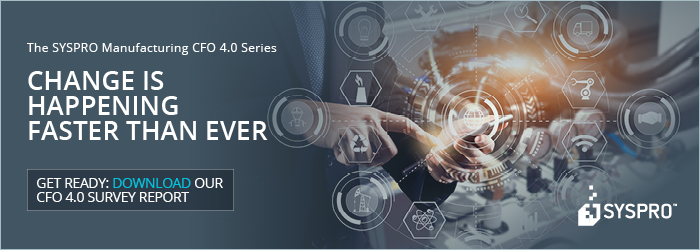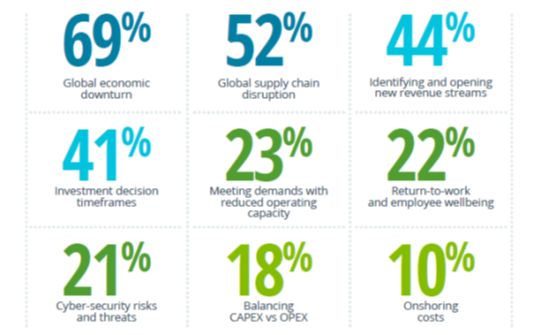While some governments seem to be floundering when it comes to pandemic exit strategies, manufacturing industry CFOs are looking beyond the current crisis and strategising as to how their organizations can pivot to flourish in these changed circumstances.
The SYSPRO Manufacturing CFO survey was conducted in October 2020, by which time the manufacturing sector has had several months to adjust to the coronavirus pandemic and the various measures taken to mitigate its impact. Our survey attracted responses from the APAC and EMEA regions, as well as the USA and Canada.
The evidence from this survey – presented and assessed in this report – indicates that optimism amongst CFOs remains resilient. Even more importantly, the results reveal changing investment priorities that are directly aligned with an accelerated move towards Industry 4.0
Although this is a comprehensive report available for download here https://za.syspro.com/product/business-digitization/syspro-2020-manufacturing-CFO-4.0-survey-report, we wanted to share the food sector highlights with you.

Good news for the Food & Beverage Sector despite a global pandemic
When asked about the impact of the pandemic on business, 25% of respondents from the food and beverage sector indicated their businesses fared as well as, or better than expected during the pandemic.
 |
This might be expected given that food manufacturing continued as essential services, however, there are some post-pandemic concerns that must be considered in the new normal. When asked when full recovery was expected, interestingly, the Food & Beverage industry (21% of respondents), which might be expected to lead the recovery due to increased consumer demand for groceries, also yielded more pessimistic responses to this question.
|
Where to from here?
It is clear that the pandemic has and continues to pose significant challenges to doing business the way we used to. When we asked CFO’s about their top concerns, the picture looks like this:
Top concerns expressed by CFOs looking to a post-corona world (% of survey respondents flagging each concern).
|
 |
Manufacturing in the new normal
Whereas people can work remotely, food manufacturing processes cannot easily be distributed from existing centres. Automation will play a key role in reducing manufacturing costs as workforces are optimised and shift towards having fewer but more highly skilled members.
Technology-based jobs can be easily converted to remote-working opportunities; however, the challenge lies in managing the transition away from ‘incompatible’ jobs i.e. relatively low-skilled, repetitive manual roles that can be easily supplanted by robots.
Will this drive to automation in the food and beverage industry happen sooner rather than expected because of the lessons learned in the pandemic?
The Pandemic will accelerate Industry 4.0.
This fourth Industrial Revolution will involve just as historic a shift as the previous three, only it will be predicated on connectivity, not coal. Industry 4.0 is seeing smart technology contribute to automation of manufacturing processes, while advances such as IoT and Machine Learning is allowing internet-enabled devices to communicate with each and make decisions based on data, often without human intervention.
Industry 4.0 will see seamless integration between all stages of the manufacturing process and the supply chain. Smart devices will make better decisions, saving costs and increasing efficiencies to unprecedented levels.
The disruption caused by the coronavirus pandemic has exposed weaknesses in the current manufacturing set-up, with its reliance on humans to actively manage processes onsite. As organizations have responded to the challenges of COVID-19 and there has been a dispersal of workforces, there is a growing realization that bringing large numbers of people together in manufacturing settings may no longer be feasible or safe.
Automation facilitates social distancing through reducing the number of people that need to share any given area. Machine-to-machine (M2M) communication and connected devices also reduce the need for people to physically visit the shop floor.
Reimagining factories to make them COVID-compliant can only be achieved at a cost; but it is likely that the future emphasis will be on investing in technology to make manufacturing smarter and less vulnerable to pandemic disruption. There are many opportunities for this approach in the food and beverage sector.
Time to move away from spreadsheets to ERP
Given the lessons learned, the survey explored the change in manufacturing CFO’s priorities. While profitability and cash flow continue as key areas of focus, other priorities identify key shifts and focus areas for the future. CFOs have clearly recognised the transformative potential of automation and Enterprise Resource Planning (ERP) software. The fact that only 14% of CFOs identified reducing their reliance on spreadsheets and other limited-scope software as a priority suggests that more sophisticated systems (such as ERP) have already emerged as a key plank in the post-pandemic evolution of manufacturing businesses.
ERP is an industry acronym for Enterprise Resource Planning. Broadly speaking, ERP refers to automation and integration of a company’s core business and refers to the business software that has been designed to record and manage your enterprise data.
An ERP system automates and integrates core business processes such as taking customer orders, scheduling operations, and keeping inventory records and financial data. ERP systems have multiple benefits to help with overall business performance management for any organization providing intelligence, visibility, analytics, and efficiency across every aspect of a business.
One of the most significant lessons learned in the manufacturing sector was the location of the bottlenecks. 42 % of respondents identified PRODUCT as the most significant bottleneck during the pandemic which links to the supply chain disruption identified as a top pandemic fall-out concern, plus the need to rethink supplier management and procurement and sourcing business models.
While the human tragedy of the pandemic cannot be overlooked, COVID-19 also represents a once-in-a-generation opportunity to reset the manufacturing sector. Trends that were already evident (the adoption of ERP, automation and the integration of Business Intelligence and Artificial Intelligence/Machine Learning) are now seen as necessities.

For more information, email SYSPRO: palesa.moshidi@syspro.com
Or visit their website at: https://za.syspro.com/







